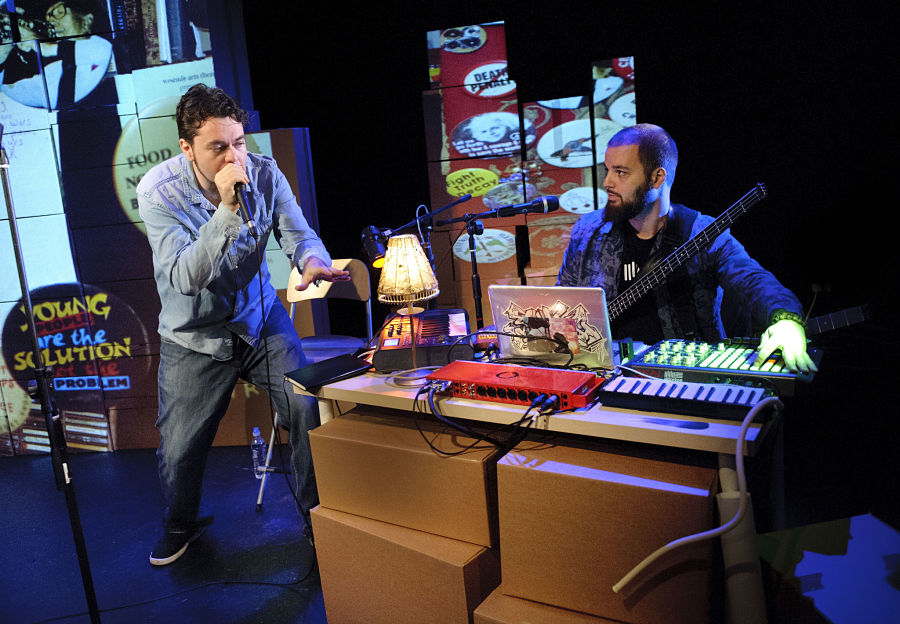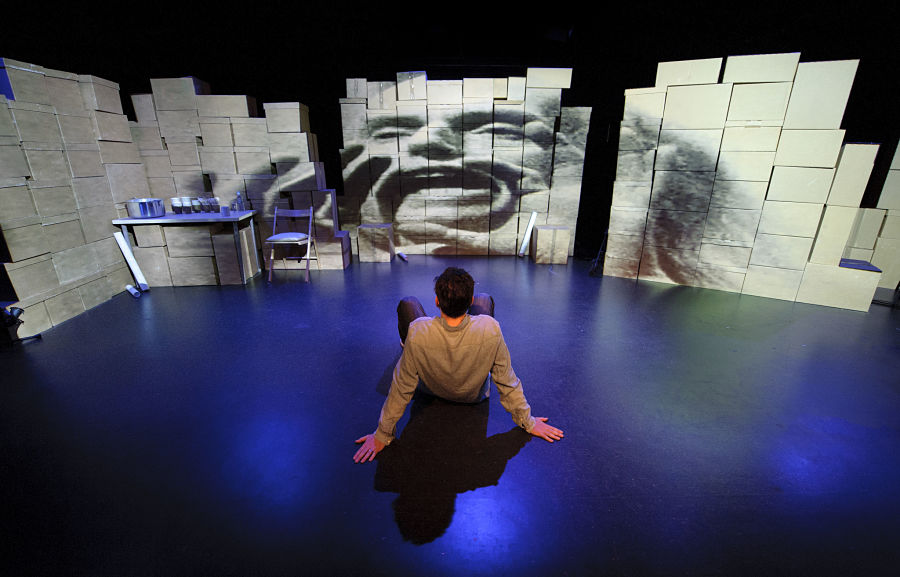If I could turn you on,
if I could drive you out of your wretched mind,
if I could tell you I would let you know.
— R. D. Laing, The Politics of Experience
There’s a new voice emerging in the American theatre, and his name is Baba Israel. Full disclosure: I’ve known Baba since he was 18. I don’t remember exactly how we met, but I do remember giving him his first public performance at a rally to end the death penalty I organized at Judson Church in 1994. He’s always been an incredibly talented and thoughtful artist with tremendous potential. But on Friday, Jan. 8, I watched him actualize that potential and come into his own as an artistic force with his show, The Spinning Wheel, which has two more performances at BRIC in Brooklyn on Jan. 15 and 16.
The piece is incredibly complex and must be experienced to be understood, though the underlying idea is fairly simple: a son memorializing his father and his father’s work through theatre. Conceived by Baba, musician Yako 440, and director Leo Kay, the production features a multimedia performance and interactive gallery exhibition featuring footage from the archive of Baba’s late father, steve ben israel. Israel died in 2012 after a rich life as a jazz musician, poet, stand-up comic, political activist, and member of the iconic countercultural ensemble the Living Theatre. Using his talents as a writer, performer, rapper, beatboxer, and more, Baba both captures his father’s legacy and explores how it relates to his own.
When I walked into the space, the first thing I heard was a jazz trio. Before Baba’s dad was an actor or a solo performer, he was a drummer and bandleader; the musicians’ presence was an homage to that element of his life. As I walked around the space, I was treated to the evolution of israel’s thought process, rendered as a gallery exhibition. The art show was a window into the mind of a creative, restless, visionary political artist—a man who used his life to open up other’s minds to the possibility of a more just and peaceful world. There were documents and photos from israel’s days with the Living Theatre, flyers advertising his solo works, and homemade posters he once put up around New York City, including one that read, ”Abolish capital punishment. The people have always been punished by capital.”
Video artist Richard Ramchurn recreated israel’s den as an installation in the exhibit; as someone who has seen the original, Ramchurn’s recreation is exactly as I remember it, down to the stereo on the desk and the flyers and buttons on the wall. There is also an interactive brain scanner in the den that leads the user through 50 years of Living Theatre performances. The gallery space also serves as the lobby; the performance is in another area. Moving the audience from the lobby to the theatre can be problematic in many spaces—either there’s no time left for the audience to get settled and the piece begins too quickly, or there’s a huge lag, accompanied by whispering, rustling of papers, and general discontent. The Spinning Wheel team has found a beautiful transition which eliminated this problem entirely: soup. Pea soup, to be exact, made and served by Yako 440.
Steve ben israel loved pea soup. When I first met him, we went to the Moondance Diner on Grand Street and had a bowl each. Because the folks at BRIC understandably don’t want audience members taking paper cups of soup back to their seats, a subset of soup eaters was left to hang out onstage almost until the moment the show began. That this didn’t faze the performers at all speaks not only to the flow of the evening and the professionalism of the artists, but to their investment in radical generosity.
This investment continued into the show itself. At the beginning of the work Baba tells the audience a story about his young daughter, Sequoia Rose, and her creation of a new female superhero, Super Flower Girl. Per Rose’s description, Super Flower Girl can “grow flowers out of all 10 of her fingertips, bring dead flowers back to life, and if someone is mean, she generates a smoothie and dumps it on their head. But then, once they have calmed down, she makes them another smoothie to help with the transition.”
The story demonstrates that Baba is confident enough onstage to share details of his family life with an audience; it also highlights the sensitivity of Kay as the show’s director. Super Flower Girl is exactly the sort of monologue that gets cut in most pieces for being extraneous, as the show is meant to focus on his dad, not his daughter. But it speaks to a pattern of child-rearing in the Israel family: the practice of giving children the freedom to discover themselves without imposing a value structure, which is crucial to their growth as human beings. Steve discovered this with Baba, and Baba passed that knowledge on in raising Sequoia Rose.
In including this section in the final production, Kay realized what most directors would probably miss: its relevance to the show as a story that’s ultimately about steve. Kay also deserves commendation for taking an archive, video clips, poetry, and Baba’s many talents to create a piece that, even though it contains multiple elements, seems absolutely seamless.

The video clips of steve performing—whether with the Living Theatre or as a solo performer—are inserted with a confident hand and serve well as transitions. Dramaturg Talvin Wilks’s talents are also on display, not only in the choices of material for the exhibition but in making sure that the script communicates the exact messages Baba wishes to convey. As a dramaturg myself, there is often a distance between what a writer thinks they are saying and what comes across. Wilks lets Baba’s hip, edgy, experimental voice come through instead of stifling it. Yako 440’s animated stencil drawings bring the video component into the now, while Baba furthers his commitment to open, unmediated communication by sharing an audiotape of him at the age of 5 having a conversation with his father.
Still, at this moment, the piece begins to trouble its own premise. While it is still putatively about the life and work of steve, other themes begin to emerge. Baba is not only telling us about his father; he is hipping us to his dad’s political trip, in the hopes that we will be inspired by his vision. At the same time, Baba is using this piece not only to celebrate his father but also to mourn him, and, in many ways, declare his independence from him. Although he is very much his father’s son, Baba is not his father. Steve was allergic to capitalism, as related during the show; Baba finds it an irrational system that he still must negotiate. Steve was an artist his entire life, yet when it was suggested to Baba that he attend LaGuardia School of the Performing Arts, he instead chose Bronx High School for Science. Steve’s musical home was jazz; Baba’s is hip-hop. Steve believed in Artaudian honesty, even if it led to verbal confrontation, while Baba believes that true personal growth is made possible by the creation of safe spaces.
As the piece went on, I realized that I was watching another kind of jazz performance: two artists jamming together, smoothly and fluidly, in real time. Baba and Yako 440 collaborated on beatbox and live loop pieces. Baba got a chance to show us his formidable didgeridoo skills. We were treated to some rare footage from the Living Theatre’s Paradise Now, in which steve tells an audience, “Violence is counter-revolutionary. The amount of bloodshed depends on you.” Near the end of the piece, Baba performs a stunning poem his father wrote titled The Spinning Wheel, which becomes the show’s emotional center. Backed by ever louder and more complex loops, it builds to an emotional and sonic climax that rivals any I’ve seen in the theatre.
When described this way, the work sounds like a mishmash of competing ideas and styles; honestly, going in, that’s exactly what made me nervous. But much like a talented chef who can put the most unlikely ingredients together and create a delicious meal, Baba and Yako 440, guided by Kay, manage to pull off the same alchemical trick and create a brilliant and meaningful work of theatrical art.
Brad Rothbart has been a company member of the Living Theatre and is currently a freelance dramaturg and theorist in Flourtown, Pa. He can be reached at scrdchao@iCloud.com.


